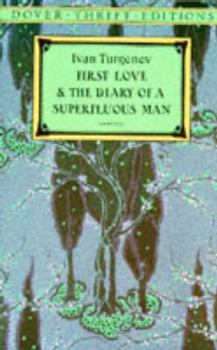First Love and the Diary of a Superfluous Man
Select Format
Select Condition 
Book Overview
Ivan Turgenev (1818-1883) was one of the greatest Russian writers of his day, and the first to gain an international reputation. His novels, among them Rudin (1856), Fathers and Sons (1862), and... This description may be from another edition of this product.
Format:Paperback
Language:English
ISBN:0486287750
ISBN13:9780486287751
Release Date:November 2011
Publisher:Dover Publications
Length:96 Pages
Weight:0.20 lbs.
Dimensions:0.3" x 5.2" x 8.3"
Customer Reviews
3 ratings
chronicle of wasted time
Published by Thriftbooks.com User , 22 years ago
"superfluous man " (Russian : Lishny Chelovek) : a character type whose frequent recurrence in 19th-century Russian literature is sufficiently striking to make him a national archetype. He is usually an aristocrat, intelligent, well-educated, and informed by idealism and goodwill but incapable, for reasons as complex as Hamlet's, of engaging in effective action. -Encyclopaedia BritannicaIn his great autobiography, Memoirs of a Superfluous Man, Albert Jay Nock meant that he was superfluous because his ideas, particularly his belief in freedom, had become so outmoded at the time he was writing--the 1940s. But the original superfluous men were Russian nobles, who led utterly meaningless lives of leisure, while peasants worked their land, servants took care of them, and autocratic government mostly ignored them. They were felt to be superfluous because they had so little to do and made so little contribution to Russian culture. For the most part though, they were treated, in literature anyway, as kind of tragic heroes, as Russian Hamlets.Thus, in Ivan Turgenev's novella, The Diary of a Superfluous Man, the young protagonist, Tchulkaturin, humiliates himself in a romantic entanglement and a resulting duel, all the while conveying the sense that there's nothing else really left for him to do with himself. Turgenev's portrayal of this hopeless character combines tragicomedy with social criticism, but it is certainly more sympathetic than not.As always, Turgenev is the most accessible of Russian authors; the Constance Garnett translation is very readable; and it is blessedly short. Even if you're, understandably, intimidated by Russian novelists, you'll enjoy it.GRADE : B+
First Love and The Diary of a Superfluous Man
Published by Thriftbooks.com User , 22 years ago
The Diary of a Superfluous Man is a diary of a fictional 30 year old man written during the last two weeks of his life. The dying man, Tchulkaturin, is exceptionally introspective and obssessed with his sense of failure and inferiority. His heated sensibilities stifle his will. He was a particular type in Russian literature, especially hated by the reformers of the day. In their eyes, he made no social contribution--hence, the term "superfluous".The Diary is not just a negative romp of a self-pitying aesthete. True, there's much complaints, hysteria, and sentimentality, but it's relieved by Tchulkaturin's amusing self-awareness. Likening himself to a useless fifth horse on a carriage, dragged along by life, he says, "But, thank goodness, the station is not far off." It was said that his birth was the "forfeit" his mother paid in the card game of life. Turgenev's ironic humor and relentless yet light-hearted social criticism add sharp levity.Tchulkaturin supports his self-assessment as superfluous with the "folly" of his life, a failed three week love affair which he claims was his only happiness. Through this vehicle Turgenev explores the themes of love, passion, illusion and will versus weakness, which is also the focus of the companion story, First Love.Tchulkaturin remembers bliss and humiliation, but he did take action. We see that no one wants to be rescued from passion, not even Tchulkaturin. Does it matter whether he reached his goal? The townspeople eventually esteemed him--perhaps he did make a social contribution and wasn't, afterall, a superfluous man. Irony upon irony and no answers.In his small room, confronting death, Tchulkaturin realizes that none of the pathetic facts of his life matter. Yet he laments he has "gained sense" too late. He sees what things have had meaning for him. No matter how small, he wants to hold onto them--he wants to live. The tragedy is that Tchulkaturin is universal, not superfluous. He, like most of us, come to realize that it is part of the human condition to feel that happiness and life seem to have hardly begun when nearly over.At the end of the diary, after Tchulkaturin has died, Turgenev adds another ironic touch that doubles as a social comment and as a device to force the infinitely unvarnished and necessary view that life goes on however it will, regardless of how we may think we have lived.First Love is the story of an adolescent who falls in love with the same woman as his father. It sensitively portrays the transformation of a child to a young man, precipated by his first passion. The unusual triangle intensifies the suspence as we wonder how the son will find out who his rival is--he knows there is one. His inevitable realization deepens his emotional life and his understanding of the complexities of human life.The story has an episodic structure from which the poetry and drama effortessly unfold, showing the son's growing love and helpless flip-flopping from child to man.The parlor games port
Just get it.
Published by Thriftbooks.com User , 23 years ago
You heard me. Read the headline over again, and then do what it says.





